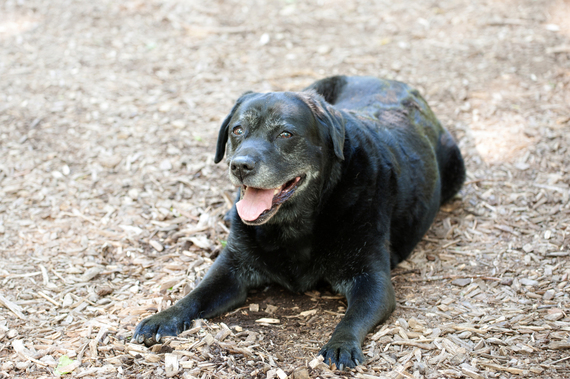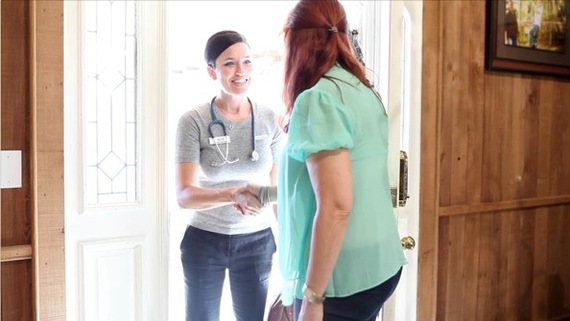In my previous blog on veterinary hospice care I mentioned my friend and colleague, L.A veterinarian Dr. Jeff Werber, and his experience caring for his terminally ill or aging patients. I was so intrigued by the concept of hospice care for pets, having just gone through human hospice with an aging parent.
"I think of euthanasia as a gift, when all other cures have been exhausted," Jeff shared.
Noting my intrigue, he connected me with Dr. Dani McVety, the co-founder of Lap-of-Love, a network of at-home hospice veterinarians who comfort and care for terminally ill and aging pets.
What began with a simple hello developed into multiple conversations, illuminating more than a simple description of veterinary hospice care. In Dr. McVety I discovered not just an eager entrepreneur offering compassion and comfort to sick or aging pets but a woman who openly shares her wisdom and kindness Hospice Veterinarians -- a pet messiah who vocalizes the fear and pain a sick pet often feels but cannot voice.
I've struggled to consolidate our conversations. I outlined hospice care in some detail in my previous post, though it felt like I'd just scratched the surface. I conclude this blog topic with direct quotes from a conversation with Dr. Dani McVety herself.
Do you have questions for either of us? Please comment below!
Sarah:In today's world I'd think it nearly impossible to find a niche that hasn't already been filled. Veterinarian hospice care -- how did you think of that? When I look at photos of you on your website you look so, so young.
Dr. Dani:I developed my focus as an undergraduate when I volunteered at a human hospice center and created the Lap of Love business with my partner Dr. Mary Gardner in 2009. They didn't teach hospice care then, but I'm teaching it now!
Yes, I'm young, but I'm old enough to know what I want from life: I want to help pets and the people that love them -- this is the route I've chosen to do exactly that. Now, I see my age as a huge asset in my field as both an inspiration to other veterinary students and as a sign of what "new blood" can accomplish in this profession of mine.
In 2013, I was privileged to be the youngest recipient of the University of Florida College of Veterinary Medicine's Distinguished Young Alumni Award, my greatest honor thus far, second only to the thank you cards I receive from families I've helped.
Sarah: What is the difference between a general care practitioner and veterinary hospice care?
Dr. Dani:Veterinary hospice care providers, as opposed to general practice veterinarian, are not focused on a cure for the disease. We aren't trying to heal your pet, nor do we recommend every possible treatment or cure.
Hospice veterinarians come into the home, bringing relief to pets at the last stage of their life, insuring the pets are both peaceful and pain free. In addition, we communicate with and support family members who are struggling with the process. We focus on the quality of life, rather than treatments that may (or may not) prolong the inevitable. Even when we assist death through euthanasia, we treat the choice as a gift, not as a "failure" of our medical options.
Death is sometimes viewed as the enemy of the living. While it's great modern medicine offers many options to treat different conditions, we have to remember that not everyone can or chooses to afford these procedures, and that diagnosis, procedures and medicines are not always as affective as we intend them to be.
Sarah:I think I hear what you're saying. Lap of Love Veterinary Hospice care doesn't argue or judge why a person may choose to let their pet go, they simply comfort the pet during their last stage of life. And they comfort the people too, so they feel less guilty about their decision.
What is the number one message you'd give to someone considering these delicate, end-of-life decisions?
Dr. Dani:Treating the disease is not always the same as treating the patient! Hospice veterinarians support the belief that at some point you have to accept that the patient is more important than the illness. While supporting a pet's immune system is warranted, and surgery can offer relief for internal imbalances, as pets age or risk a sufferable condition, there comes a point where a procedure may be more stressful or life-limiting than the ailment itself.
My favorite quote -- from Jurassic Park, funnily enough -- is, "Just because we can doesn't mean that we should." So, it translates for me too -- Just because you might be able to try another remedy or procedure, doesn't mean that you should do it.
Sarah:Changing the subject for a moment, I heard that 80% of veterinary school graduates are woman these days. That's astounding. Does it help being a female in a position that requires immeasurable, consistent, and unwavering empathy?
Dr. Dani:Absolutely! Some of our clients will actually refuse to see a male doctor, I've never heard of someone refusing a female doctor. Lap of Love has over 90% female doctors at this time.
Sarah:Okay. So tell me how it works. What does a hospice veterinarian do all day?
Dr. Dani:As a veterinary hospice practitioner we go into our patient's homes, treating a pet where they feel most safe. We spend a lot of time talking to families about their options. Together we balance the disease process, the family's wishes, and the pet's personality; these are three separate and very distinct areas. It's our job to find where they overlap.
For instance, let's look at bone cancer. It has the potential to go from "okay" to "very bad" in a split second if the bone weakens enough to break. We present all possible realities and then work to determine what the families wish for their pet. Many want to hang on until the last minute, which can spell out discomfort for the pet; in that case, we administer drugs to comfort the pet and alleviate pain. We always emphasize that medications are only so effective, and when the suffering becomes unbearable, we let the family know that too.
Pets are all different. Some have higher pain thresholds and can endure discomfort; others go out of their mind and may become aggressive as they try to cope with their agony. These differences are very important to consider when we are deciding how best to treat a pet and when to mitigate suffering completely via euthanasia.
Sarah:I feel we can't talk about veterinary options without talking costs. I know many clients complain they are talked into procedures before they know the extent of the cost/cure value. One of my clients was irate when she learned that a surgery only had a 30 percent shot of curing her pet's condition, and the procedure had cost over $10,000! She felt she had been guilted into a procedure by her veterinarian who had not informed her of the cost or the prognosis. Her pet lived another 6 months, but two months were spent in recovery, and the rest, forcing pills down her throat. It left my client sad, angry and resentful.
Dr. Dani:In veterinary school, I started to truly understand the limitations of my medical education and the importance of communication. Veterinary medicine is not funded by Medicare or Medicaid, and pet insurance, although wonderful, has its limitations as well.
As veterinarians, we need to demonstrate the value of what the client is about to pay for (i.e., diagnostics tests, medications, or therapies they may not fully understand) by conveying our deep love and commitment to making the pet feel better.
I started to realize as a student that when we do not convey that commitment fully, the clients do not feel supported or heard and may feel judged. Clients that feel judged do not share their thoughts with their doctor and risk draining one of their 4 budgets: time, emotion, physical, or financial. When one of these budgets is drained, the human-animal bond is at risk of being broken.
Veterinarians do not sell medicine -- the vaccines, surgeries, medications... that's not our product. The human-animal bond is our product. Without that bond, our profession will cease to exist as we know it.
Sarah:You have so much wisdom. I think I've told you my favorite "pearl." Can I hear it one more time?
Dr. Dani:Sure! Death isn't the opposite of life. It's the opposite of birth! No one should ever suffer pain -- there are so many options to comfort a pet nearing the end of their time on earth. Lap of Love's veterinary hospice care gifts us the time leading up to death to comfort our pets as we prepare ourselves for final goodbyes.

